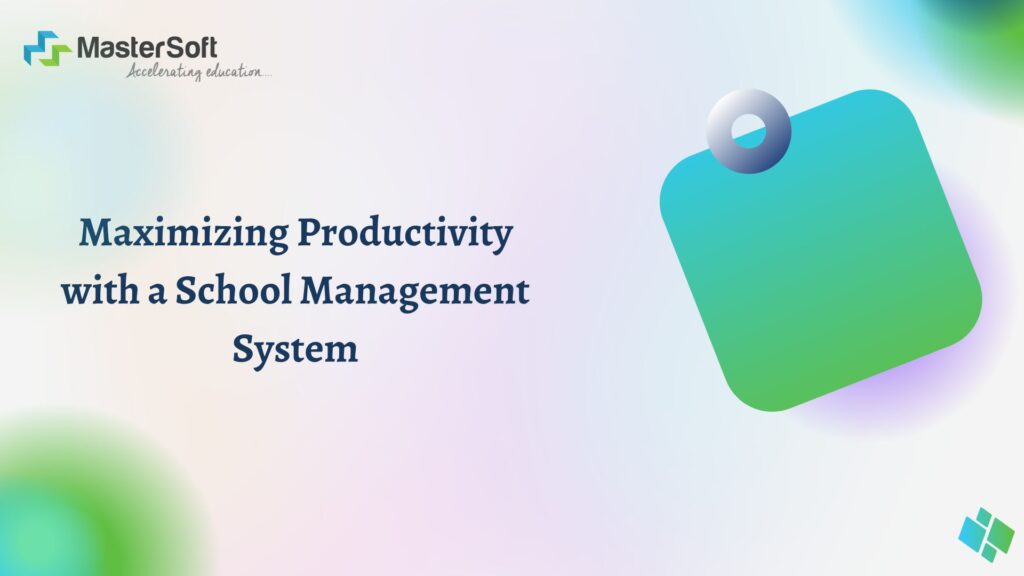In the fast-paced world of education, efficient management of administrative tasks is crucial for ensuring smooth operations and maximizing productivity. Traditional methods of managing school-related processes, such as student enrollment, attendance tracking, and academic planning, often involve manual, time-consuming tasks that can lead to inefficiencies and errors. However, with the advent of School Management Systems (SMS), educational institutions now have access to powerful tools that streamline administrative workflows, improve communication, and enhance overall productivity. In this blog post, we’ll explore how implementing a School Management System can revolutionize productivity in educational institutions, benefiting administrators, teachers, students, and parents alike.
Streamlining Administrative Processes:
One of the primary benefits of a School Management System is its ability to streamline administrative processes. Tasks that were once manual and time-consuming, such as student registration, fee collection, and timetable scheduling, can now be automated and managed efficiently through the use of an SMS. With features such as online enrollment forms, automated fee reminders, and timetable generation tools, administrators can save valuable time and resources, allowing them to focus on more strategic initiatives and student-centered activities.
Enhancing Communication and Collaboration:
Effective communication is essential for fostering collaboration and ensuring that all stakeholders are informed and engaged. School Management Systems provide a centralized platform for communication between administrators, teachers, students, and parents, facilitating seamless collaboration and information sharing. Through features such as announcements, messaging, and event calendars, an SMS promotes transparency and accountability, keeping all stakeholders up-to-date on important information and events.
Improving Data Management and Analysis:
Data-driven decision-making is critical for driving continuous improvement and achieving organizational goals. School Management Systems offer robust data management and analysis capabilities, allowing administrators to collect, analyze, and visualize data on various aspects of school operations. From student attendance and academic performance to financial management and resource allocation, an SMS provides administrators with valuable insights that inform strategic planning and resource allocation decisions.
Empowering Teachers:
student information system also empower teachers by providing them with tools and resources to enhance their productivity and effectiveness in the classroom. With features such as gradebooks, lesson planning tools, and communication portals, an SMS enables teachers to streamline administrative tasks, communicate effectively with students and parents, and focus more time and energy on instructional activities and student support.
Engaging Parents and Students:
Parental involvement is crucial for student success, and School Management Systems play a key role in facilitating communication and engagement between parents, students, and educators. Through features such as parent portals, progress reports, and online assignments, an SMS provides parents with visibility into their child’s academic progress and allows them to actively participate in their child’s education. Similarly, students can access resources, submit assignments, and track their progress through the SMS, promoting autonomy and accountability.
Ensuring Security and Compliance:
Data security and privacy are paramount concerns for educational institutions, especially when it comes to sensitive student and staff information. School Management Systems prioritize security and compliance, implementing robust security measures such as encryption, authentication, and access controls to protect sensitive data. Additionally, SMS platforms adhere to relevant regulations such as GDPR and FERPA, ensuring that data is handled in accordance with legal and ethical standards.
Conclusion:
In conclusion, implementing a School Management System can have a transformative impact on productivity in educational institutions, enabling administrators, teachers, students, and parents to streamline processes, enhance communication, and make data-driven decisions. By leveraging the capabilities of an SMS, educational institutions can maximize efficiency, improve collaboration, and ultimately, create a more conducive learning environment for all stakeholders. As technology continues to evolve, School Management Systems will play an increasingly important role in driving productivity and innovation in education.


